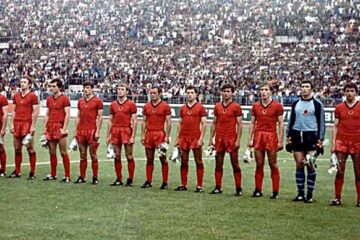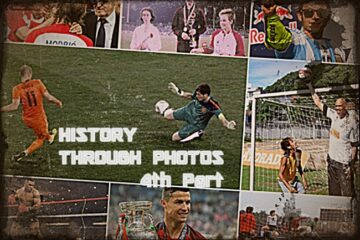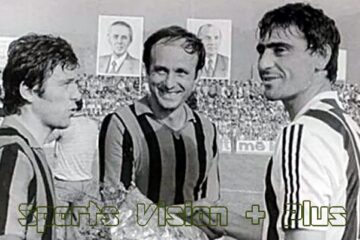The Journalist and the Football Player | With Borici from Helsinki to Budapest!

Memories from the well-known journalist Skifter Këlliçi
-Do you know, Loro, when I first saw you at the stadium? … I asked Boriçi this question late that afternoon of June 20, 1972, when the plane had just taken off from the gray runway of Helsinki airport, to take our representative, whom I was accompanying as a journalist, to Budapest, from where our team would take the train to Belgrade and then from there by bus to Tirana. Unfortunately, that was how our “Kombetare” traveled abroad at that time!..
Sitting next to me, Loroja shrugged and smiled a little in surprise. And he was right. -One afternoon in October 1945, when I was only seven years old, -I continued, – and when in the Tirana stadium, which would later be called “Qemal Stafa”, the Tirana representative, where you also played, won 5-2 against the Macedonian national team. Do you remember?
-That’s all I remember, -, Loro answered me.
-In that match I scored three goals.
-One of which was from the 11-meter penalty, – I added…
-How well you remember!
I had had the opportunity to talk to Boriçi about sporting events before, especially in interviews on Radio Tirana and TVSH, but never for so long, more than during this flight. I reminded Loro that ever since that match that I had watched together with other children from the neighborhood, I fell in love with him, also because he was from Shkodra, like my mother. So a year later, again with children from the neighborhood, I attended the 1946 Balkan Games, when after the victory against Bulgaria (3-1), Boriçi scored two goals and after another victory against Romania (1-0), Albania became the Balkan champion in football and he, on the podium, raised the victory cup.
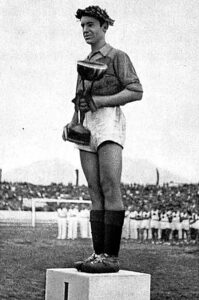 Since then, many of us minors, I explained to Loro, would force our mothers to sew the number 9 on our rowers, the number that he wore, the great striker Boriçi, captain of the national team and of “Vllaznia”, twice champion in 1945 and 1946.
Since then, many of us minors, I explained to Loro, would force our mothers to sew the number 9 on our rowers, the number that he wore, the great striker Boriçi, captain of the national team and of “Vllaznia”, twice champion in 1945 and 1946.
After these words, Loro laughed, even more so when I reminded him that back then, on the cab of an old truck on the road that divided our neighborhood in two, where we played football, I imitated Anton Mazreku and nicknamed “Our Boriçi”, a tall boy, taller than us, whom all the children envied because he played so well with a ball, especially one made of cloth…
So, as the plane cut through the clouds that were blazing in the late sun, I continued to tell Loro other memories related to his life on the football fields. In 1953, Boriçi had been playing for “Partizan” for six years, since 1947-48, when he had completed his military service. And we children, like thousands and thousands of others throughout Albania, had become fans of “Partizan” because we adored… Loro.
I reminded him of the occasion when, in the championship final of that year against “Dinamo”, he headed the ball in front of goalkeeper Vogli, who remained frozen; the ball hit the ground, went out and a few minutes later Bakalli scored, “Dinamo” won 1-0 and was declared champion.
He explained to me that that occasion was one of the most bitter memories of his life as a footballer. (A year later, in an interview included in the Kinostudio documentary film “Across the Football Fields”, Loro and I happened to be right in front of the gate of the “Qemal Stafa” stadium, where he explained to me that if he had shot 100 times, he would have scored the same number of goals).
In the mid-1950s, Albania did not know what it was like to play with a center forward in a 3-2-2-3 formation. But I, even though I was 13-14 years old, was impressed by Loro’s playing behind, while the two half-forwards joined in a line with the wingers (3-3-4). But years later, when I became a journalist, I read in the foreign press that this was how the great Hungarian center forward Hidgkuti had started to play.
I asked Loro if he had been influenced by him. He laughed, “No,” he replied, “I had only played against him once, in 1950 in Budapest, but I felt that this was how international football should be played.”
What intuition this great footballer had! It was not for nothing that after the Hungary-Albania match that year, as my teacher and then colleague, Mazreku, who had commented on the match, later explained to me, the Hungarians had told him that the legendary Hungary of the 1950s needed a center forward like Boriçi.
While he was speaking, I remembered an article by Anton Mazreku, published in 1938, in the newspaper “Sporti Shqiptar”, where he had been impressed by the beautiful play of a 16-year-old footballer from “Vllaznia”, who stood out a lot. He was talking about Loro. Four years later, the same Mazreku in the daily “Tomori”, when describing the “Juventus”-Lazio match, held in Turin, in which the Albanians Lushta and Boriçi faced each other, after evaluating both of them, underlined: “Boriçi, 20 years old, a player with a body to be envied with a brilliant future ahead of him”. And he was not wrong.
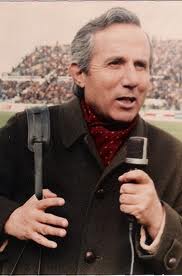 Then I asked Loron if he remembered when we first met. I didn’t think he would. But that’s not how it happened. “In the spring of 1962,” he explained to me without thinking, “when you invited me to a Radio Tirana studio for an interview, after I had been given the title “Merited Master of Sports.” And he was the first to be given this title, all the more so when, after returning from higher studies in Bulgaria in 1962-63, 64-65, he had made “Partizan” the champion, and in 1971 also the champion of the Balkans…
Then I asked Loron if he remembered when we first met. I didn’t think he would. But that’s not how it happened. “In the spring of 1962,” he explained to me without thinking, “when you invited me to a Radio Tirana studio for an interview, after I had been given the title “Merited Master of Sports.” And he was the first to be given this title, all the more so when, after returning from higher studies in Bulgaria in 1962-63, 64-65, he had made “Partizan” the champion, and in 1971 also the champion of the Balkans…
We were interrupted from this conversation with such touching memories only by the voice of the plane pilot, who informed us that we were landing at Belgrade airport…
…Once, ironically, in the late hours of an October afternoon in 1981, a year before he passed away, I happened to meet Boriçi in front of a store in line to buy… potatoes, what the dictator Enver Hoxha called both bread and food. But we didn’t have a chance to talk, because the buyers, as soon as they noticed him, against his wishes, put him first in line.
“What a pity,” a trusted friend said to me in a low voice. “This footballer who would have played in every sports club in Europe, and would have become rich, out of the desire to raise the glory of football, had returned to his homeland to remain poor, but loved and respected, like many other talented people like him.
So when he is remembered, even children who have never met him say about him: “Loro of the ball, Loro of everyone”…
By Skifter Kellici
(June 1972)
Publishing date in this site May 28, 2025
______________________
Sports Vision + Plus / Champions Hour in activity since 2013
Discover more from Sports Vision +
Subscribe to get the latest posts sent to your email.


